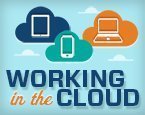A lire sur: http://searchconsumerization.techtarget.com/essentialguide/Working-in-the-cloud-How-IT-enables-mobile-productivity

Mobile productivity tools and working in the cloud have made corporate employees' jobs a lot easier, but the trends have created some concerns for IT administrators. Learn some of the ways to combat those challenges.
GUIDE CONTENTS
Cloud file-sharing services and mobile productivity tools have changed the way employees work and caused some strife for IT administrators.

Today's workers demand access to corporate data on the go. Companies have to carefully consider which mobile devices to provide, how to enable constant access to resources and how to keep data safe. That's a lot of bases to cover.
Working in the cloud can present some security and manageability concerns, but it can also help workers be more productive. Because workers' cloud use is probably not going to stop any time soon, it's time for companies and IT departments to find solutions to common problems that come with this trend.
To find the answers to top-of-mind questions about mobile productivity and working in the cloud, check out this special report, produced in partnership with TechnologyGuide.
NOTEBOOKS OR TABLETS?
1. Choosing devices for mobile workers
Today's workforce uses mobile productivity tools and cloud file-sharing services to get work done in and out of the office, forcing IT pros to review their mobile strategies. When it comes to choosing between buying notebooks or tablets for workers, companies have to think about end-user segmentation to figure out which devices will work best for which users.
Which devices should mobile workers use?
To pick the right notebook or tablet for mobile workers who use the cloud, companies have to look beyond just the hardware and consider platforms, applications and users' habits.
BUILT-IN CLOUD STORAGE
2. SkyDrive vs. SkyDrive Pro: Which is better for business?
Microsoft's consumer cloud service SkyDrive integrates with Windows 8 and 8.1, which is a great feature for Windows users on the go. For IT pros, however, it creates concern around which corporate files are being stored where. Companies that encourage working in the cloud with enterprise-grade services such as SkyDrive Pro, WatchDox and the corporate versions of Box and Dropbox could stymie potential data leaks.
Consumer cloud integration illuminates need for corporate cloud services
SkyDrive integration is baked into the Windows 8.1 operating system, which highlights the need for an enterprise cloud service. Microsoft's SkyDrive Pro and other enterprise-grade cloud services can help.
NETWORKING DISCONNECT
3. Connectivity issues don't have to impede productivity
Mobile workers expect to be able to connect to the Internet anytime, anywhere, but the reality is that Wi-Fi and cellular connectivity aren't ubiquitous yet. On the bright side, being disconnected from the network doesn't mean employees have to lose all hope of mobile productivity. Syncing data to cloud file-sharing services frequently and using applications that have offline capabilities can help end users stay productive, even without the net.
No network connection? No problem
End users who sync their files often and use applications that have offline modes can keep working in the cloud even if their network connection is broken.
CLOUD RUNDOWN
4. Enterprise cloud file-sharing options
Companies have tons of cloud file-sharing services to choose from. They can opt to let workers use consumer cloud services for work, they can offer a private cloud or on-premises tool, or they can look to cloud providers that offer services with an enterprise focus. Services include WatchDox, ShareFile, DataNow and SkyDrive, to name a few.
Enterprise cloud storage services at a glance
Cloud storage and file-sharing services that target the enterprise can help meet IT's security and management needs and prevent corporate data loss. Learn more about some of the services that are available to choose from.
READ ON
5. More resources about working in the cloud
Working in the cloud is a pervasive part of the way employees stay productive. Dig deeper into the cloud file-sharing services and tools that employees are using for work and learn more about them with these additional resources.
Google Hangouts vs. Skype
With Hangouts, Google is taking on Microsoft's Skype. Take a look at the features of each video-conferencing tool and decide which one might work better in your company.Which UC apps should you move to the cloud?
To determine whether you're ready to move some unified communications applications to the cloud -- and which ones should go -- ask yourself five simple questions, including, "Am I comfortable forfeiting control?"How social services are evolving in the workplace
Many social strategies in businesses today still include consumer tools such as Twitter and Facebook, but integrated, enterprise-grade social software is proving its worth, too.Dropbox vs. Box: A cloud storage comparison
Cloud storage services such as Dropbox and Box can make mobile workers more productive. Both providers use a "freemium" model that scales to business class, but they offer different features at different price points.
Aucun commentaire:
Enregistrer un commentaire